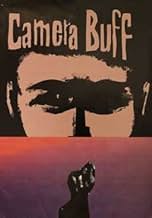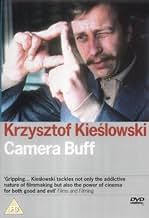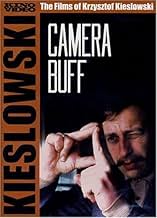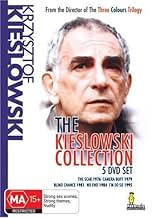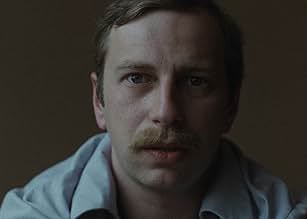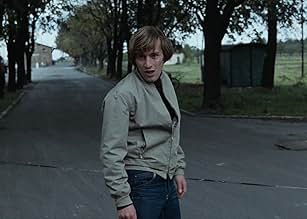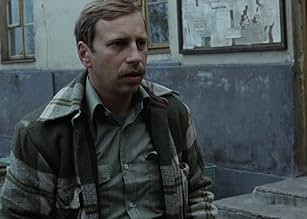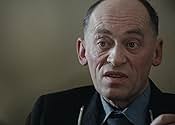Füge eine Handlung in deiner Sprache hinzuAn ordinary factory worker buys a camera on the occasion of the birth of his child. The authorities order him to make documentaries about the factory's success. But his endeavor to be truthf... Alles lesenAn ordinary factory worker buys a camera on the occasion of the birth of his child. The authorities order him to make documentaries about the factory's success. But his endeavor to be truthful leads him to opposition against censorship.An ordinary factory worker buys a camera on the occasion of the birth of his child. The authorities order him to make documentaries about the factory's success. But his endeavor to be truthful leads him to opposition against censorship.
- Auszeichnungen
- 6 wins total
Empfohlene Bewertungen
"Camera Buff" explores censorship in Communist Poland and its repression of the individual's expression of his observations. Filip also confronts the consequences of a man who discovers new possibilities and finds his former world, which had been so fulfilling before he'd discovered filmmaking, rendered dull, old, and limited.
The story is interesting solely because of the Communist aspect. If it was just a story of man who becomes obsessed with making movies, it would be just another story about movies told in the form of a movie. But the Communist aspect? If one man in town has a camera, it suddenly becomes a tool for the entire city. It's interesting. This could be beautiful or ugly, depending on who happens to be in power.
Krzysztof Kieslowski's third feature is a meditation on the power of film and the inability of a finite work of art to accurately reflect the infinite world, or even the myriad complications of a small town. As Stuhr's skills and connections grow, he comes to see everything through an imaginary camera lens, not seeing anything outside his self-imposed frame. Beautifully shot by five cameramen, dialogue by Stuhr, make this a fine journey of self-discovery.
One of the best things in the world is to take someone you love deeply and trace them back in their histories, back back before you knew them. Back until you see all the butterflies that nudged each other to produce what you need and feed.
And before the shape was mature. Yes, then you can see the structure, the limbs before they flowered and even surprise yourself a bit.
I'm in love with Kieslowski. Oh he isn't my favorite filmmaker, and not the one I spend time with when I need to learn and grow. But he is someone to have tea with, a friend who has his own way of fluffing air with apparent lovely slight fogs but when you encounter them you find them informed, nourishing, psychotropic. More than lovely. "Heaven," though not all his, is something I wish on every soul and every vehicle he had driven until then carried him there.
This is Kielsowski's first feature. It was before he entered into that odd writing partnership where some external force (Piesiewicz) created some sort of conventional frame on which our artistlover could drape his folds, lace and knives. Before that clever partnership that hid the mechanics.
Here you can see his favored machine, the simple fold: a movie about movie-making and love, and all the related dimensions he knew at the time: intellectual, death, rutting, wistfulness, justice. Passions all. Urges all. At the end, it loops upon itself, the ladder complete to start again at the beginning of the next.
It isn't particularly profound or satisfying by itself. But if you are a lucid mind today, chances are you think about narrative flows and how you and the world use them to wind around and buffet each other. And almost certainly you have had tea with Kieslowski.
If so, you'll find this model of his younger self will tell you something about yourself in an odd, indirectly magical way. If you do, check out the trigger for passion here: Chopin.
Ted's Evaluation -- 3 of 3: Worth watching.
Wusstest du schon
- WissenswertesThe film's opening scene and Irka's nightmare about a hawk killing a chicken are reminiscent of Ken Loach's Kes (1969) -- a film about a boy who takes to training a wild kestrel in order to escape his troubled life. Later, Filip can be seen reading a filmmaking text and turning to a section about Ken Loach and Kes (1969). This reference is twofold. First, Filip is clearly inspired by filmmakers like Loach in making social realist films about working-class people. Second, Irka is tormented by images mirroring Kes (1969) which represent her husband's budding obsession with this type of filmmaking.
- Zitate
Piotrek Krawczyk: [looking at a roll of motion picture film] It's beautiful what you guys do. A person's no longer alive, yet she's still here. It's beautiful.
- VerbindungenFeatured in Fejezetek a film történetéböl: A lengyel film (1990)
Top-Auswahl
- How long is Camera Buff?Powered by Alexa


